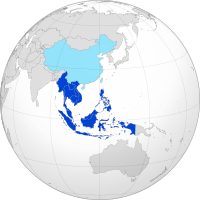You can help expand this article with text translated from the corresponding article in Chinese. (October 2021) Click [show] for important translation instructions.
|
| 竹网 | |
|---|---|
 | |
| Countries and territories | |
| Languages and language families | Chinese, English, Burmese, Filipino, Indonesian, Khmer, Laotian, Malay, Thai, Vietnamese and many others |
| Major cities | |
The Bamboo network (simplified Chinese: 竹网; traditional Chinese: 竹網; pinyin: zhú wǎng) or the Chinese Commonwealth (simplified Chinese: 中文联邦; traditional Chinese: 中文聯邦; pinyin: Zhōngwén liánbāng) is used to conceptualize the links between businesses run by Overseas Chinese in Southeast Asia (in a narrower sense with the Hokkien and Teochew peoples) .[1][2] It links the Overseas Chinese business community of Southeast Asia, namely Malaysia, Indonesia, Singapore, Thailand, Vietnam, the Philippines, and Myanmar with the economies of Greater China (Mainland China, Hong Kong, Macau, and Taiwan).[3] Overseas Chinese companies in Southeast Asia are usually managed as family businesses in a centralized bureaucratic manner. In an article in The New York Review of Books, Indian critic Pankaj Mishra called it a "largest economic force in Asia outside of Japan".
- ^ Pablos, Patricia (2008). The China Information Technology Handbook. Springer. p. 204.
- ^ Cheung, Gordon C. K.; Gomez, Edmund Terence (Spring 2012). "Hong Kong's Diaspora, Networks, and Family Business in the United Kingdom: A History of the Chinese "Food Chain" and the Case of W. Wing Yip Group". China Review. 12 (1). Chinese University Press: 48. ISSN 1680-2012. JSTOR 23462317.
Chinese firms in Asian economies outside mainland China have been so prominent that Kao coined the concept of "Chinese Commonwealth" to describe the business networks of this diaspora.
- ^ Weidenbaum, Murray L.; Hughes, Samuel (1 January 1996). The Bamboo Network: How Expatriate Chinese Entrepreneurs are Creating a New Economic Superpower in Asia. Martin Kessler Books, Free Press. pp. 4–5. ISBN 978-0-684-82289-1.